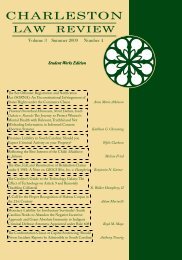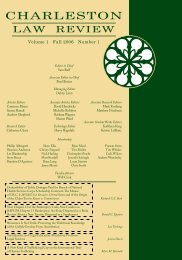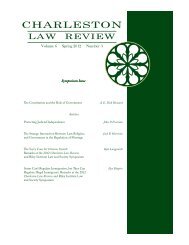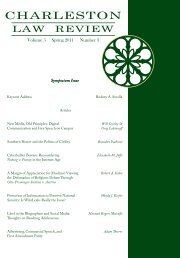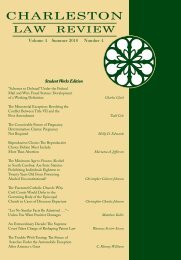Volume 5 Winter 2011 Number 2 - Charleston Law Review
Volume 5 Winter 2011 Number 2 - Charleston Law Review
Volume 5 Winter 2011 Number 2 - Charleston Law Review
You also want an ePaper? Increase the reach of your titles
YUMPU automatically turns print PDFs into web optimized ePapers that Google loves.
SCHULZE FINAL.doc1/20/<strong>2011</strong> 6:14PMCHARLESTON LAW REVIEW [<strong>Volume</strong> 5head-start, and supporting non-traditional law students. 302. First-Year Academic Support MethodsFirst-year academic support methods are myriad. Someprograms focus initially on students with academicindicators showing a potential for the need for assistance. 31Other programs focus primarily on minority or non-traditionallaw students. 32 Still other programs take a different approach,remaining open to all students and slowly narrowing in onstudents whose law school performance indicates the need forsupport. 33Oftentimes, the decision of which style of program toimplement depends upon the individual law school’s philosophyregarding the potential stigma students might feel as a result ofthe ASP. 34 For instance, a program focusing strictly on students30. See Boylan, supra note 26, at 26 (calling for all law schools to adoptpre-law school programs to offset the disadvantage suffered by students lackingcultural exposure to the Socratic method).31. See Garfield, supra note 12, at 494–96.32. See id.; see also Paula Lustbader, Walk the Talk: Creating LearningCommunities to Promote a Pedagogy of Justice, 4 SEATTLE J. SOC.JUST. 613, 629(2006) (noting that the ASP at Seattle University School of <strong>Law</strong> is for nontraditionalstudents).33. Dionne L. Koller, Legal Writing and Academic Support: Timing IsEverything, 53 CLEV. ST. L.REV. 51, 54–55 (2005–2006). For instance, manyASPs provide weekly or occasional workshops in the first semester, open to allstudents, which focus on study skills all students need, such as outlining, casebriefing,reading cases, etcetera. See, e.g., id. at 55. These programs oftenemploy individual counseling only at the behest of the student or if a professorrefers a student due to the observation of the need for support. Id. In thesecond semester, though, these programs may begin to target students forindividual counseling of other remedial measures based upon a student’sunderperformance on mid-year exams. Id. In this way, any stigmatizationeffect is not an artificial “self-fulfilling prophecy” because the student receiveddeficient grades prior to individual targeting for academic support. See CynthiaSchmidt & Ann L. Iijima, A Compass for Success: A New Direction for AcademicSupport Programs, 4 CARDOZO PUB. L.POL’Y ÐICS J. 651, 680–81 (2006)(“[T]eachers’ expectations of students are communicated to the students byvarious cues, and that students respond to those cues by performing up or downto those expectations.”).34. Chris K. Iijima, Separating Support from Betrayal: Examining theIntersections of Racialized Legal Pedagogy, Academic Support, andSubordination, 33 IND. L.REV. 737, 773 (2000) (noting the stigma associated280



